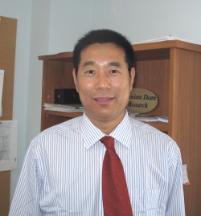Proving maths really adds up for society
Published on 04 December, 2012
CQUniversity's Professor Qing-Long Han has been striding the world stage in Mathematical Sciences, proving along the way that maths really adds up as a boon for society.
Professor Han is a researcher in time-delay systems, networked control systems, robust control and fault-tolerant control.
Almost every aspect of our lives is impacted by networks of one type or another. Production of food, appliances, cars, planes, ships, clothing, just about everything, relies on networks for process control. Transport systems and power generation and distribution are heavily reliant on vast networks.
Networked control systems are spatially distributed systems in which the communication between sensors, actuators and controllers occurs through a shared band-limited digital communication network. Networked control systems are so important they have potentially significant economic impact on a broad scale.
Professor Han says intelligent networked systems behaviour can be viewed as the convergence of four major areas - networks, computational intelligence, data mining and agent-based systems.
An intelligent system can be defined as one that adapts its behaviour to meet its goals in a changing environment. Over the past decade, the scope of intelligent systems research has expanded from its past focus on individual system behaviour to now address the issues involved in networked behaviour. This is evidenced through the emergence of major new research areas such as network control, sensor networks, ubiquitous radio frequency ID and supply chain management.
The hallmark of work by Prof Han and his colleagues in these areas has been a focus on quality research as evidenced by top journal publications, quality research higher degree completions and national competitive grants
The CQUniversity academic has been honoured with a range of distinguished adjunct roles at several Chinese universities. For example, the Talents Coordination Committee of Shanxi Province confirmed that Professor Han had been selected and appointed to the status of a '100 Talents Program' Chair Professor due to his outstanding contributions to control theory and control engineering.
Prof Han gained major ARC funding towards his research into the effects of network-induced delays on networked control systems.
In recent years, Prof Han has also been collaborating on an ARC project which is the first in the world to lay the foundation for a new theory for understanding and designing new variable structure control systems in the networked environments.


